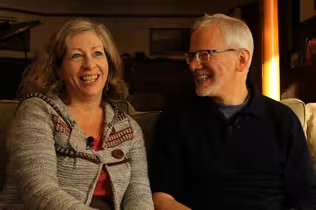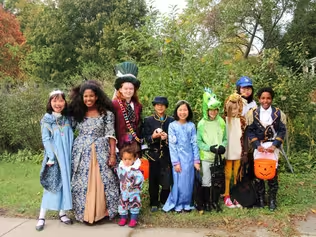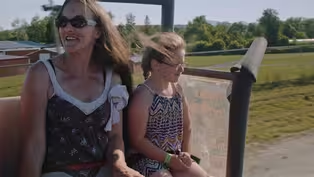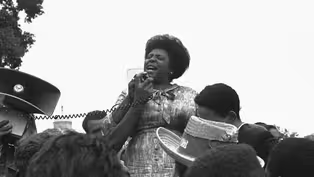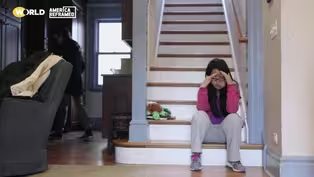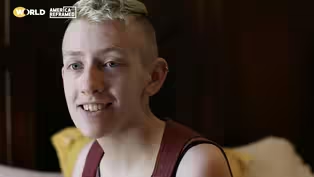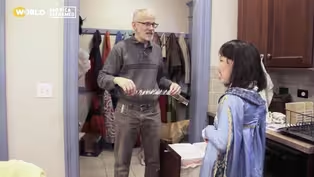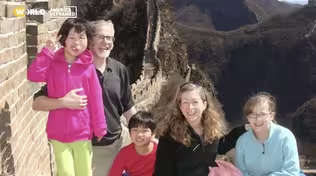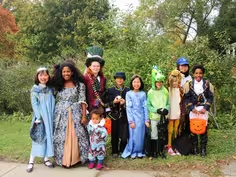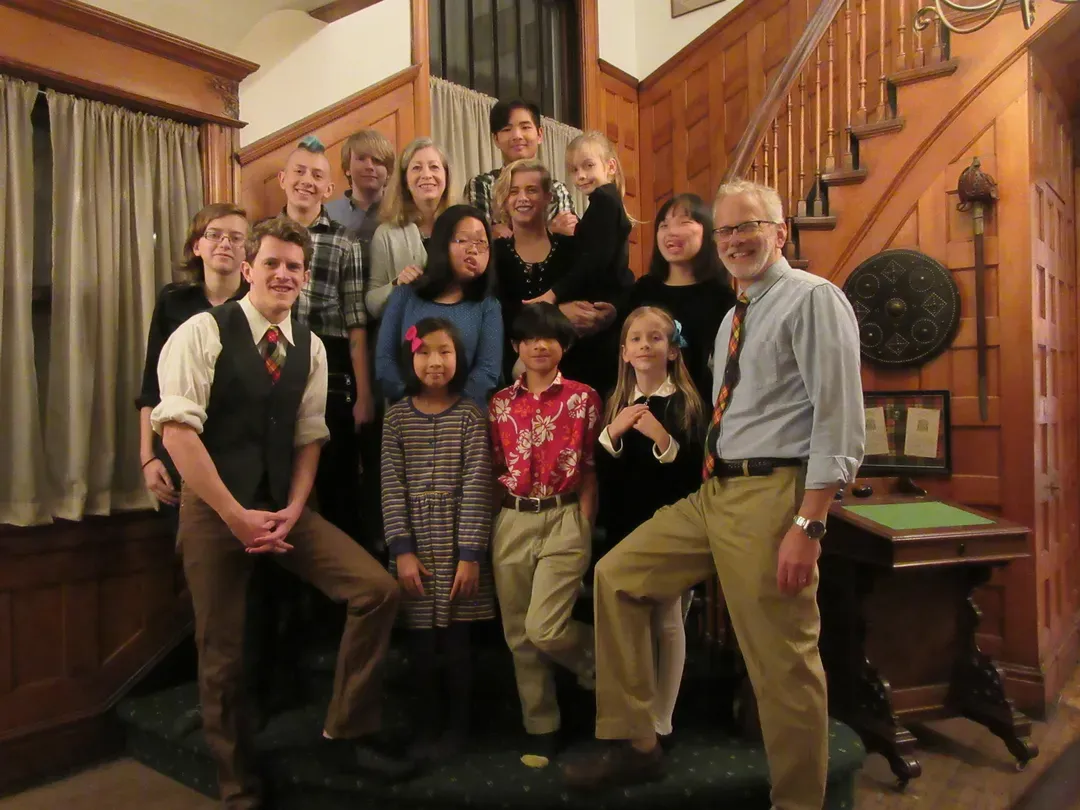

Hayden & Her Family
Season 9 Episode 14 | 56m 14sVideo has Closed Captions
The Currys welcome five international adoptees with special needs into their large family.
The Currys are raising twelve children, five of whom are adopted from overseas and have special needs. One of those children is Hayden, a young girl from China born with linear nevus sebaceous syndrome. Hayden becomes the thread to this intimate adoption journey as she, her new parents, and her siblings experience the complexities, jealousies and joy of becoming a family.
Problems playing video? | Closed Captioning Feedback
Problems playing video? | Closed Captioning Feedback
Major funding provided by the Corporation for Public Broadcasting and the John D. and Catherine T. MacArthur Foundation. Additional funding provided by the Wyncote Foundation, the National Endowment for the...

Hayden & Her Family
Season 9 Episode 14 | 56m 14sVideo has Closed Captions
The Currys are raising twelve children, five of whom are adopted from overseas and have special needs. One of those children is Hayden, a young girl from China born with linear nevus sebaceous syndrome. Hayden becomes the thread to this intimate adoption journey as she, her new parents, and her siblings experience the complexities, jealousies and joy of becoming a family.
Problems playing video? | Closed Captioning Feedback
How to Watch America ReFramed
America ReFramed is available to stream on pbs.org and the free PBS App, available on iPhone, Apple TV, Android TV, Android smartphones, Amazon Fire TV, Amazon Fire Tablet, Roku, Samsung Smart TV, and Vizio.
Providing Support for PBS.org
Learn Moreabout PBS online sponsorshipMore from This Collection
Video has Closed Captions
In a divided New England town, an unexpected leader emerges to heal her community. (1h 24m 24s)
Video has Closed Captions
The remarkable life of a fearless Mississippi sharecropper-turned-human-rights-activist. (58m 41s)
Providing Support for PBS.org
Learn Moreabout PBS online sponsorshipNATASHA DEL TORO: The Curry family has 12 children.
JUD CURRY: I would say that our family is sometimes conspicuous, but it feels like a completely ordinary family to us.
It's hard to have new sisters all of a sudden.
- I want my own room!
DEL TORO: The challenges, and rewards, of this unique family's journey.
ELIZABETH CURRY: Love is bigger and so much more multifaceted than just that biological connection.
DEL TORO: "Hayden and Her Family," on America ReFramed.
♪ (train rumbling) ♪ (child crying) (crying continues) ♪ (child sobbing) ♪ ♪ ELIZABETH: I was poking around this advocacy site, you know, idly scrolling through children, and was struck by this child, and thought to myself, "Boy, there is a child who really needs a family."
CHILD: I'm strong.
WOMAN: You are, you are!
(people talking in background) ELIZABETH (calling): Minh!
Phoebe!
Hayden!
(children playing, toys rumbling on floor) - Get off.
- Hey!
ELIZABETH: We get up.
we get dressed, people do their work.
Chaos ensues-- this one.
JUD: So when we first adopted, I think it was your idea, right?
- Uh-huh.
- Yeah.
Um...
But I'm pretty easygoing about it, right?
- You are-- he's very easygoing.
Um, to the point where I'm very hesitant to tell him about a child, because... - I might say yes!
(laughs) ♪ I work at North Park University in Chicago, but I think I identify myself much more with my family than I do with my profession.
I would say that our family is sometimes conspicuous, but it feels like a completely ordinary family to us.
♪ One, two... Three.
You.
- Huh?
- Right there.
- 57?
Oh...
I'm gonna die.
- I don't think so.
ELIZABETH: My mom's an only child of an only child, and my father essentially is an only child, so I grew up without cousins.
My brother and I were always the youngest ones at family gatherings, and I longed for a, a big family.
♪ I remember seeing a television special called Who Are the DeBolts?
(And Where Did They Get 19 Children?)
And I loved it.
I loved the size of their family.
I loved that they were all different.
I loved that they had different needs.
And I loved that they were all embraced no matter what.
CHILD: A good movie, a very good movie, about the DeBolt family.
ELIZABETH: It showed the children for the children, and not for the special needs that they had.
I just loved the whole dynamic of the family.
I wanted to be part of that somehow.
(computer keys clicking) I started keeping a blog in 2005 to share both the challenges and joys of raising a large family that included a wide variety of children.
I'm just raising my family.
I'm not thinking about how I am such a better person because I do more laundry.
I don't think I'm a better person at all.
I'm a mom, just like anyone else.
(talking in background) JUD: We started off just as any normal couple might, having children one at a time.
♪ (people talking in background) ARCHER: My name's Archer Curry.
Birth name is Margaret, but I go by my middle name.
And I am the oldest child, and the first biological child.
(talking softly) ARCHER: I don't actually remember the first time they told me that they were going to adopt.
It kind of just seemed like the next logical thing that was going to happen for our family.
ELIZABETH: While Duncan was a baby, I would be nursing and rocking this absolutely perfect little boy that I was so in love with, and I would rock him and I would just be filled with absolute grief for a child I didn't know.
I just felt like there was a child out there who was not being held by his mommy.
And it was completely inexplicable, because I had this absolutely gorgeous child in my hands.
JUD: So she started researching international adoption, and we began the process.
ELIZABETH: And so we adopted Minh.
He was three when he came home.
(talking softly) - One.
Five?
JUD: We were drawn to him that, just the sweetness of his face, and the sense that this was that little boy that Elizabeth had, had felt was out there somewhere.
ELIZABETH: Six months later, we started the adoption process again, because we knew we didn't want him to be the only dark-haired Asian child in a family of blond-haired children.
We wanted to give him a sibling.
And so that was Kiet.
ARCHER: He was very small, very scared, very nonverbal.
Which we kind of expected, because they said that he'd been developmentally delayed.
DUNCAN: When we adopted Kiet, basically all they said was, "We're going to adopt someone."
And we were just, like, "Okay!"
(chuckles) (people talking in background) Sometimes I feel that I need my own space.
Like, when I feel like that, I come to my room and rest a little bit.
(child whines loudly in background) (all talking at once) - I need a piece of paper.
ELIZABETH: Yeah, I'm gonna get paper out.
Just a moment.
KIET: I have a turtle.
I have a turtle!
I have a turtle!
I have a turtle and a human being swimming.
Mommy, in the drawer, could you get me wire?
ELIZABETH (faintly): Where is it?
- In the drawer right above you.
CHILD: I need a piece of paper!
MINH: Yeah, is there a wire I could use?
ELIZABETH: Yes.
(all speaking indistinctly) ELIZABETH: So, did everybody hear my list?
We've read about octopus, cuttlefish, squid, starfish, sea urchin, sea cucumber, jellyfish, anemone, sharks, rays, crabs, lobsters, clams, scallops, conchs, and nudibranchs.
JUD: So now we had seven children.
We had two adopted from Vietnam and the five biological children.
And I guess I... At that point, I would have said, "This is impressive, we're done!"
(laughs) ELIZABETH: A couple of months later, I discovered I was pregnant.
JUD: Then we got the news that it was twins.
Gigi and Lena were the result of that.
ELIZABETH: And that was really overwhelming for a good long time, and I was feeling done and tapped out, and... ...really, really thought maybe our family was complete.
JUD: Until she saw the picture of Hayden.
♪ ELIZABETH: I kept thinking about the little girl.
I'd go back and look at her picture and think, "That's insane and crazy."
She was a little girl with an obvious facial deformity.
In the description, it said, "Hayden wants a mommy and a daddy to love her and sing to her and fix her good food to eat."
I couldn't let it go.
JUD: Elizabeth had that feeling like, "Oh, my goodness, this is my child."
ELIZABETH: And so we pursued her adoption.
♪ MINH: We were all kind of, like, nervous, and excited and all that stuff.
I've seen pictures of her, like the whole year before.
And we was, we'd been, like, Skyping and other stuff.
But we finally met her.
And that was weird because, like, "Oh, she's going to be my sister," but, like...
I don't know, it was just, like, weird taking it all in.
I know, yeah.
- And you give me a dog.
- Dog, I did not give you a dog.
- Yes.
- Oh, yeah, I did give you a dog.
- Look.
- Yeah, that dog.
This dog.
Yeah.
♪ ALICE: She got very attached to me because we spent a lot of time at the hotels together.
And coming home, she didn't really know who everyone else was, but she knew who I was.
♪ The one thing I was kind of surprised by was how young she acted.
I thought, like, she would act her age, but she hadn't learned much in the school and, like, no one really talked to her at the foster home.
So that was surprising.
Use your muscles.
- Close your eyes.
- I can win with my eyes closed, too, ready?
(both laugh) ELIZABETH: You're gonna be doing origami with Meiying while you're here?
- Yeah.
- Yeah?
ELIZABETH: Thank you.
- You're playing here.
- You have a playdate here.
MAUREEN HARPER: My name is Maureen Harper.
I met Elizabeth in the homeschool community in Evanston.
And, and we've been great friends ever since.
We have seven children, four biological and three adopted.
- (laughs) MAUREEN: They want to go play.
(voiceover): When Hayden came home, it was great anticipation on our part.
Elizabeth's kids were staying with us, so we were part of their Skyping every night to visit and, and to meet Hayden.
So we were very excited.
HAYDEN: Who goes first, you or me?
Choose.
- You can go first.
MAUREEN: Hayden's environment was such that she didn't even really know how to play.
Children who are coming from an orphanage, sometimes they're not given toys, because it's easier to contain the children, if you have many children, if you don't have them fighting over toys.
HAYDEN: Go.
- Ten.
- Go.
And...
BOTH (simultaneously): Uno!
- (chuckles) HAYDEN: Back in Chicago, I saw them, Gigi and Lena, Duncan, Kiet, Phoebe.
And my room.
It's so great, I love it.
This is my room.
You should a picture of my door, look it!
These are all on my door.
Oh, no, this come off now.
BRUCE BAUER: She has what's called Sebaceous Nevus Syndrome, fairly uncommon congenital deformity or defect.
These are often seen as stripes of lesion between normal areas of skin.
In her case, they're very extensive, they cover parts of her face, forehead, scalp.
♪ ELIZABETH: She has skin overgrowth, tissue overgrowth, she has bone overgrowth, and she has brain overgrowth, which causes some brain abnormalities.
So that we're constantly trying to keep seizures under control and it can also impair cognitive function.
Hayden is able to learn and process things, it just happens at a slightly slower speed.
She also has some memory issues, but I'm still not convinced whether that's syndrome-related or if that's trauma-related.
BAUER: There's some surgery we can do at younger ages.
We can work on the upper part of the face, we can work on the upper part of the jaw to a point, and there's some surgery that we have to wait till skeletal maturity, which is about age 14, 15, 16 in young women.
(kids playing) JUD: She has a deep desire to look like everybody else.
(laughing) JUD: Coming with us, in addition to having a mommy and daddy, she clearly understood that she would have surgery.
And she was in a hurry, that she was sort of, like, "Okay, well, we're here now.
When do I get to look like everybody else?"
♪ FILMMAKER: What are you expecting the doctors to do to you?
HAYDEN: Well, make pretty.
They will take this bad skin, and they will put new skin on here, just like here.
FILMMAKER: Would you draw it?
- Yeah.
ELIZABETH: From the time we met her in China, for the next year and a half, two years or so, she was like the perfect child.
Everything was happy, everything was fine.
It was as if any emotion at all just scared her so much that she couldn't reach down and even begin to touch it.
♪ ♪ ELIZABETH: As she's begun to feel safer, we have started to see real emotion.
When she doesn't get her way, she'll pout.
Sometimes, she will haul off and slug a sibling, which you don't want to encourage, but on the inside, you're also thinking, "That is so wonderful!"
JUD: Afterwards, she often then wants to talk about, do Mommy and Daddy still love you when you cry?
When you're angry?
And that's obviously a chance to say, "Yes!"
(people talking in background) ELIZABETH: I look at people with disabilities so differently now than I did when I had five healthy children.
And I have to say, it does become a little addictive to find the humanity in that package that other people are willing to write off as a set of special needs.
(people talking in background) CHILD: Shh!
JUD: Any family can have children with special needs, whether it's through adoption or through birth.
It doesn't make us different as parents.
It doesn't make us different at first as parents.
- At first-- it doesn't happen because we're different to begin with.
- Right.
JUD: What I think we've learned is that the people who choose to adopt, they were willing to take a step and say, "Well, I'm not sure if I can do that, but I'll try."
And that's the same with us.
At each step along the way, it's just sort of, well, you know, we did that, maybe we could do this.
ALL: For home and love and all things true, we give our thanks, oh, God, to You.
For food that's sent to us each day, accept this grace that we now say, amen.
(talking in background) WOMAN: Go, Duncan.
ELIZABETH: Duncan, there's vanilla ice cream in the big freezer.
DUNCAN: Okay!
This is for Gigi and Lena.
This is for Blaine.
ARCHER: With any number of siblings, you kind of understand that there's a certain weight of responsibility that comes along with that.
And yes, I babysat sometimes, but my parents have always been very good about the fact that they are the ones who raise their children, and I never felt like I was raising my siblings.
(talking loudly, laughing) ALICE: Gigi, blow!
ARCHER: I feel like people look at our family from the outside and think, "How do you do that?"
We look at their families, where both parents are working and there's, like, one or two kids, and think, "How do you do that?"
Like, that seems so quiet and sad and lonely.
What do you do when you grow up and your one sibling is across the country and you have no family near you?
How is that better than what we have?
(laughter) ♪ ELIZABETH: I think what people miss out on are all the positives that come from having more brothers and sisters around.
(yelps) JUD: It's also not a zero-sum game.
ELIZABETH: Right.
JUD: It's not that every parent has one quantity of love and attention to give, and, you know, for each child you add, well, you got to slice that thinner.
ELIZABETH: Yeah, it's that my love can't be used up.
- Daddy!
Mommy!
I don't think there's a limit on how many siblings I could have.
There's always room for one more.
(dog barking, people talking in background) ELIZABETH: Okay, everybody, look at me, say, "Merry Christmas!"
ALL: Merry Christmas!
ELIZABETH: Money, I will admit, is a constant worry.
JUD: Yeah.
I've stayed up late at night worrying about that.
ELIZABETH: I will say, as a parent, I do wish we had the resources to provide some extra things that we just monetarily can't.
JUD: Elizabeth is very good at stretching the material resources that we have, whether that's holding on to clothes that, you know, somebody is going to grow into at a later date, repairing or sewing new clothes, grocery shopping.
She could have her own TV show on grocery shopping, you know, for, for very little money.
We've chosen to forego some things that other people might feel are non-negotiable.
ELIZABETH: I don't feel like our lives are impoverished because we still use flip phones.
I would probably still use a flip phone even if I could afford a smartphone, just because... - Just because she's, yeah.
- I'm reactionary that way.
(laughing) ELIZABETH: You are tall enough to get your stocking and put it back, yes.
(child giggles) ELIZABETH: I pay the bills every month, and somehow the bills get paid.
God has provided every step of the way.
I don't see Him stopping anytime soon.
- ♪ On the 12th day of Christmas ♪ ♪ My true love gave to me ♪ 12 pipers piping - What?
- ♪ 11 drummers drumming♪ ♪ Ten lords a-leaping ♪ Nine ladies dancing, eight maids a-milking ♪ ♪ Seven swans a-swimming, six geese a-laying ♪ ♪ Five golden rings♪ ♪ Four calling birds♪ ♪ Three French hens, two turtle doves ♪ ♪ And a partridge in a pear tree ♪ (laughing and talking) (audio fading) ♪ (train rumbling) ♪ JUD: We'll be bringing home two little girls.
The first one has the same diagnosed special need that Hayden has.
TING TING: Mommy?
JUD: Yes, Mommy.
(laughs) JUD: And so Elizabeth said, "Well, maybe we should be the ones to adopt her."
And we both sort of laughed and said, "Oh, yeah, that's not very likely, is it?"
- Actually, you said, "Tell me when you win the lottery."
- That's right.
(both laugh) ELIZABETH: The next day, I open up my email to discover that Ting Ting, this little girl, has been given a $25,000 adoption grant, which is the adoption-world equivalent of winning the lottery, because $25,000, that's pretty much the full adoption costs.
JUD: You know, in the face of something like that... (laughs): You sort of feel like, "Okay, I guess so," you know?
"I guess this is what we're doing."
And there was another little girl that Elizabeth also had been aware of and advocating for.
Yu Ting.
- (giggles): Yu Ting.
JUD: Again, it was sort of a, "Well... We'll try."
And each step along the way, the doors opened.
I think our job is just to keep taking that next step and just see, "Okay, "how is it going to be provided for tomorrow, and the next day and the next week?"
And so it's very much an act of faith.
ELIZABETH: Hey, everybody.
KIDS: Hi!
DUNCAN: Ni hao, Yu Ting!
JUD: That's Lena.
There's Gigi, hi, girls!
HAYDEN: Hi, Daddy.
So how are you guys doing?
- Good.
- Good.
- Good!
ARCHER: They didn't actually say, "Hey, we're going to adopt two more."
They said, "We're thinking about this.
Do we have your approval?"
Because at this point, they recognize that if something were to happen to them, as the oldest kids, me and Blaine and Alice would be the ones who would take on the care of the younger kids.
So...
They asked my permission beforehand.
Hayden, when we get home, Yu Ting loves to eat fried rice for breakfast.
HAYDEN: Yeah, I'll cook, I'll cook fried rice.
JUD: And Ting Ting wants to eat eggs for breakfast.
- I will cook eggs and fried rice.
JUD: So you can help cook breakfast for them.
- Sure.
GIGI: Hey, I can cook eggs, too!
(laughing) Gigi, you're funny.
Gigi... ELIZABETH: Are you saying Didi, or Gigi?
(laughing) (train bell ringing) ♪ (talking indistinctly) (Ting Ting exclaiming) ELIZABETH: Whoa, watch what you're doing.
Okay, go in, go in, go in the house, please.
DUNCAN: Ting Ting, come over here.
Ting Ting, Ting Ting.
TING TING (reading slowly): "Well...
Welcome..." DUNCAN: This is yours.
- That's me?
- Yeah, these are for you.
CHILD: One, two... - Barbie, Barbie... - Yeah, this is a Barbie.
(strumming) TING TING: Hey!
(talking indistinctly) HAYDEN: This is mine.
(laughs, talking indistinctly) This is my bathroom.
(children talking indistinctly) JUD: Where's Yu Ting?
DUNCAN: I think Yu Ting's in the front, I mean, the living room, doing the piano.
JUD: Oh, okay.
(playing slowly) JUD: How are you doing?
- Good.
- Good.
(people talking in background) (clears throat) (child sighs) (piano playing slowly in background) (kisses Hayden) JUD: It's hard to have new sisters all of a sudden.
- I want my own room.
- I know, but Mommy and Daddy have to share, and Gigi and Lena have to share, and Duncan and Minh have to share.
So you get to share, too, for a little while.
♪ ELIZABETH: Be prepared to meet your child where he or she is.
Allow them the time to grow and mature and to experience love that they missed at the beginning of their lives.
(vacuum cleaner whirring) (vacuum stops) (talking in background) Minh drew this, you drew that.
KIET: Kick me!
(grunting) (scuffling continues) CHILD: Hi, Yu Ting!
KIET: Yu Ting, do you want to learn karate?
Stand like this... CHILD: Very, very, very... - This, and that.
Do this.
(grunts) (feet stomping) (laughs) ELIZABETH: Yu Ting just turned nine, and we believe that she has cerebral palsy that has yet to be confirmed.
KIET: Let's keep on going.
(laughing, playing) ELIZABETH: We're finding that she's really exceptionally bright and on top of things, and catches on.
And she's also incredibly sunny and optimistic and cheerful and just... JUD: And curious and interested in things.
ELIZABETH: And curious, yeah, and just a happy child.
That's Yu Ting.
TING TING: ♪ Twinkle, twinkle, little star ♪ ♪ How are you, blah, blah, blah ♪ JUD: Ting Ting, she is, on paper, on the documents, they show her age as ten years old.
But when you kind of put together the pieces of the known history, she's almost certainly more like 13 years old.
(toy playing) Her diagnosis is Linear Nevus Sebaceous Syndrome, which is the same diagnosis that Hayden has.
(alphabet song playing, Ting Ting groans loudly) JUD: But of course they're very different, and she's not really been challenged to be independent in a lot of ways, which leaves her functioning at a much lower level than I think she's capable of, ultimately.
(groans, alphabet song ends) (Ting Ting moans) ELIZABETH: To put a number on it, cognitively and functionally, we're looking at, like, two or three.
JUD: Yeah.
- (singing along to toy): ♪ Next time won't you sing with me?
♪ Yeah!
Happy, happy.
♪ - Kiet, you need to go easy on Ting Ting.
I'm going to go easy on Ting Ting.
- Okay.
Ting Ting, it's your turn.
HAYDEN: Ting, fight, come fight like this.
- Ready, you need to fight!
JUD: Hayden is really taking on that role of the big sister who can be a little bossy maybe, sometimes, but who also is just a super helper.
We know how far Hayden has come.
Let's see how far Ting Ting can come.
(speaking Mandarin) - I'm, I'm... - Ting Ting... - I'm your referee.
- Hey!
- I'm Ting Ting's referee.
Fight!
Come up.
- You can stand up now.
(laughter) - Haw!
- Pow!
Don't-- okay... ♪ ELIZABETH: It's been hard on everyone.
And by everyone, I am definitely including Ting Ting herself, for whom it has been the most difficult.
If we are going the brutally honest route here, I will say, I have never felt like such a failure as I do much of the time parenting this child.
I know about trauma.
I know about attachment disorders.
I lived with these things in more than one of my children for years.
Yet this time, it feels harder.
Much harder.
JUD: Elizabeth's father passed away just before we went to China.
And wrestling with that grief over the course of the year has been a challenge for our whole family.
ELIZABETH: My father died, and it was unexpected.
So transitioning two new girls who are dealing with their own stuff, and then your own children who are dealing with the stuff of, "My family is now different and I have to jostle for my place one more time."
And then finding room for your own mess, there's just not a lot of time for that.
JUD: Really, Elizabeth just put her grief on hold, of necessity.
(Yu Ting crying) - What happened?
YU TING: Mama!
- I'm right here, what happened?
- I bumped my nose!
- You bumped your nose?
- (wailing) - Whoopsie!
Whoopsie.
JUD: I mean, that kind of grief isn't something you get over in a month, or six months, or a year.
And especially during the first year.
As different kinds of anniversaries and events come up and pass by... ...whole new, unexpected waves of grief can, can be part of that.
ELIZABETH: Hold that gently on, okay?
Yeah, you really did that.
How'd you do that?
(voiceover): I think I'm coming to realize that, when my kids were littler, I had a bigger support system.
As far as friends and people who understood me, I was going through life with a lot of other people in the same phase of life.
As we veered away from the typical path, you realize that, "Wow, "my life looks so different from all these other people."
And as a consequence, your social circle becomes increasingly smaller.
♪ Heidi!
(clapping) ELIZABETH: I have a lot of friends via the internet who are in the same situation I am, and they're incredibly lonely.
It is a universal thing.
Ask any mother raising special needs children, and I would venture to guess that 99% would say loneliness and lack of social support would be the hardest part.
- Good.
LENA: Bonjour!
- Bonjour.
Set the table.
- Bonjour.
Mama.
♪ JUD: Hello.
TING TING: Hello, Daddy.
JUD: Hello, Ting Ting.
It was okay, but now I've got a headache.
(kiss) We need cup.
JUD: Ting Ting, do you want to help set the table?
Do you want to help do that?
TING TING: Yeah.
HAYDEN: Hey.
No, look, there's already one there.
You're going to put one here.
You're going to put one here for Duncan.
Duncan doesn't have a glass.
HAYDEN: Do you need any more?
ELIZABETH: Yeah, you didn't get Duncan a glass.
JUD: Duncan doesn't seem to have a glass.
(voiceover): For both Hayden and for Ting Ting, the consequence of Linear Nevus Sebaceous Syndrome is that the structure of the brain is just badly wired.
And it's not something that they're going to grow out of.
ELIZABETH: Parenting Ting Ting has been particularly hard.
I don't think anyone could have anticipated the degree of regression that she experienced.
She essentially completely lost all language.
- Mommy.
- What?
What?
Words.
What?
Words.
- Words.
You have to use words.
(unintelligible) - Is that your place?
- You can say, "This is my place."
- My place.
- And where did Mommy put the medicine?
At your place?
- No.
- No?
- Yes.
Where's the medicine?
Show me where the medicine is.
Right there.
- Whose place is it at?
- Who's place is that?
- Me.
- Yeah, you.
So it all works out.
(voiceover): She is missing so much, and it's so hard for her to interact with the world around her that there is no reciprocity in the parent-child relationship at the moment.
She will touch me continuously, but that's very different than a child giving you a loving embrace.
That's just, "I need physical attachment to someone, "you are close, and so you are the one I'm going to touch right now."
(talking in background) ELIZABETH: She doesn't like to look people in the eye.
She doesn't like to open her eyes.
You don't know how much you miss that connection until it isn't there.
Ting Ting, finish your milk, please.
- How do you say okay?
TING TING: I'm full.
ELIZABETH: Drink your milk.
- You're full?
Okay, finish your milk and then you can be all done.
Okay, you need to have a seat.
ELIZABETH: Go get ready for bed.
- Up you go.
ELIZABETH: You got stretches to do.
YU TING: Pika, Pikachu.
Me, I'm a Pikachu.
JUD: You, too.
ELIZABETH: Drink your milk.
(voiceover): It's getting better over time, but it's hard to live with essentially the shell of a child.
JUD: If you want to see this child really develop, we have to be the motivating force.
(kids talking in background) (cabinet closes) JUD: Basic balance and movement... ELIZABETH: Pull yourself over.
JUD: Those are challenging to her.
She can't balance well on one foot.
ELIZABETH: Use those muscles, pull yourself over.
There you go.
No, wait, stay there.
Whoa, whoa, whoa, go back, go back, stay on your tummy.
- I can't... - Stay on your tummy.
Okay, we're going to get on our tummy.
- (groans) - Okay, pull back.
- Wait.
- Dada!
JUD: I'm watching, I'm watching.
(voiceover): The other week, Elizabeth was having her walk, you know, a painted line on the pavement.
You would have thought that we were asking her to walk barefoot over hot coals, the amount of shrieking... She didn't even try to balance herself.
It was sort of a sense of, "If I just go boneless, they'll stop asking me to do this."
But we're a little too stubborn for that, and she was able to do it.
And then, a little bit later, we saw her just do it all by herself.
- On your elbows.
One, two, three, four... - So hard!
- I know.
Five, six, seven... - No, it's so hard!
- Eight, nine, ten.
- Mama.
- Okay, relax.
JUD: Good job.
- Good job, relax again.
ELIZABETH: You don't feel like you're ever doing the right thing, because she fights you at every turn.
One more time.
- (moaning) - Uh-huh, one more time, here we go.
Nine, ten, you're done.
JUD: Okay, we have a lot of stories.
(kids talking softly) KIET: Can you, like, sit in the middle, Daddy?
Hey, Daddy, can you sit in the middle?
JUD: Um...
I don't know if everybody can see if I sit in the middle like that.
It's easier if I sit like this and then people can look over my shoulder, too.
(kids exclaiming) - Turn around, Ting Ting.
(kids murmuring) GIGI (whining): I want Daddy to sit there.
I am very close to you.
Okay, first we'll read the "Egg in the Hole" book.
(Gigi crying) "One day, up in the hayloft of the barn, "Henny laid an egg.
"The egg rolled through a hole in the floor "to a room down below.
'Oh, my, I hope I haven't lost it,' she said."
(makes rolling noise, Kiet imitates) (Gigi crying) Gigi, when we get to your story, you can switch places, okay?
(Gigi yowls loudly) - (murmuring softly) - Yes.
When we get to her story, we will switch places.
"'Have you seen my egg?'
asked Henny.
"'Yes, I have,' said Billy Goat.
'It fell in my ice cream.'"
ELIZABETH: Along with the feelings of failure come the feelings of guilt.
Guilt that I am not living up to what all the people in China had hoped for their darling girl.
♪ In China, Ting Ting had an amazing support system.
She had two churches worth of people who were heavily invested in her well-being.
They are the ones who raised the money for her adoption and they had prayed very, very hard for an adoptive family to come forward.
And we were that family.
We were the answer to many, many people's prayers.
And I realized that that can be burdensome.
JUD: "From out of the hole appeared a tiny mouse.
"'Henny,' he said, 'I have found your egg.
"'But something very special happened.
It has broken and is in a lot of little pieces.'"
ELIZABETH: You feel like you're letting a whole bunch of people down by being an average parent.
- (laughing): You're right.
"You have a brand-new baby chick in its place."
- Baby chicken.
- Mm-hmm.
"Henny was so pleased.
"She had lost her egg, but now she was so happy "to have a baby chick instead.
"You would be, too, wouldn't you?
'Hi, Mommy,' said baby chick."
- Hi, Mommy.
♪ (birds chirping) JUD: I don't think that we could have undertaken the adoptions of all five of our adopted children without the motivation of our faith.
(congregation singing, piano playing) ♪ It is well with my soul ♪ With my soul JUD: This isn't just something we thought would be fun.
We have felt that God's put a call on us.
(hymn continues) ELIZABETH: When you go through hard times with those children, it can often feel as though you've made a mistake or you didn't understand correctly, or... ...that God really isn't there with you.
- ♪ My sin not in part ♪ But the whole ♪ ELIZABETH: You do this big step of faith, and sometimes life gets harder, but you keep going.
And you have to hold on to those initial feelings that, "This is what I was really meant to do."
Because otherwise, you don't have the strength to go on.
♪ Praise the Lord, oh, my soul ♪ (hymn ends) LENA: 3:00.
ELIZABETH: Mm-hmm.
- 2:00.
- 2:00.
- Six.
KIET: Ting Ting!
HAYDEN: What?
- Are you washed up?
- No, she's not.
JUD: When Ting Ting's laundry is folded, Hayden will help get it in the right drawer and get it put away.
HAYDEN: I'll wash up.
JUD: Often, Hayden will help Ting Ting get breakfast, getting out Ting Ting's medicine.
Little things like that.
(children talking) ♪ (children talking) JUD: With Hayden, we are continually amazed at each new step that she takes.
♪ ELIZABETH: If you were to compare it with other children without her same issues, it would seem very small.
But for Hayden, it's enormous to be able to do the level of solid first-grade work, and making progress.
And if it takes us the next eight years to make more gains, you know, we have all the time in the world.
We don't have to be done at 18.
HAYDEN: Remember, no touchy touchy.
KIET: Ooh, do we need a sledgehammer?
Yeah.
(children talking) JUD: No, we don't need a sledgehammer.
LENA: I want to see the sledgehammer.
JUD: It says it's sold.
That's sold.
KIET: So it means someone bought it?
JUD: The chicken coop, yes.
- Daddy, what's this for?
- What, this?
This is for brushing your teeth.
- No.
- No?
Combing your hair?
Maybe it's for combing your hair.
- No, this is for combing leaves.
- For raking leaves, yes.
- Then why are we buying it?
- Because we need to rake leaves.
But not today.
ELIZABETH: We've also watched her become much more adolescent.
She doesn't want to be one of the little kids anymore, and frankly, she's actually become super-helpful.
- Daddy, you got to write it.
- Oops, I have to sign it, you're right.
- Wow.
- Silly daddy.
Very silly daddy.
(bags rustling) JUD: She doesn't talk about it much, but I think she's still aware that her face is different, like an adolescent in that way of being aware of how she might look to others.
ELIZABETH: Every so often, she'll point to a part on her face that she's not particularly fond of, and I'd say, "We can talk to Dr. Bauer about that."
And at the moment, the dislike of surgery is still far outweighing any dislike of personal appearance.
At 14, she's better able to know herself what she wants and what she doesn't want.
And if she never had another surgery, ever?
That would be okay.
♪ I'm so-- I'm so excited to get earrings.
JUD: Ting Ting has made some strides.
For example, the kids love to ride their bikes, and we had a bike that was large enough for Ting Ting.
And so I put some old training wheels on it.
However, initially, she could not figure out how to make her feet go all the way around the pedal.
How are you doing there?
Good job.
(voiceover): We spent hours and hours sort of running alongside her with our hands on the pedals, trying to help her to make it all the way around.
And finally, she was able to do that.
She can actually ride down the block all by herself, and then turn the bike around and ride all the way back.
Daddy, show Mommy!
JUD: To see Ting Ting doing that seemed like a huge milestone, and a pretty significant step forward for her.
(vacuum whirring) (giggling) (car passing) GIGI: Hey!
LENA: You're my prisoner!
I'm going to swing you around by your tail.
(both laughing) JUD: You don't have to be special and different and noble to adopt.
You just have to decide to do it, and the rest of that you figure out as you go.
(talking in background) JUD: Ready to punch a hole in this.
ELIZABETH: It might be hard, it might be frustrating, it might be tiring, it might be lonely.
But you also know that, yeah, you're actually really making a difference to someone, maybe more than one someone.
When they can suddenly count to 100, I get to be there and watch it.
That's no small thing.
- It's stuck.
JUD: Turn around.
GIGI: I'm a dragon.
JUD: Okay.
Look at that.
Raise your hands up.
There!
Beautiful.
(voiceover): Some people run for the school board.
Some people volunteer.
Some people go into the ministry.
This fills for us that sense of purpose that, you know, we're part of a bigger thing.
And I think that's why Elizabeth is so committed to conversations in communities about adoption, wanting people to know, this is the reality of it.
- One, two.
One... (laughing) JUD: Lena, were you going to make a cardboard crown?
- I was, but I don't have enough time.
ELIZABETH: Do we not have any type of crayon upstairs in the costume store?
JUD: Oh, upstairs!
I didn't look upstairs yet.
CHILD: No, we don't, we don't.
JUD: Are you sure?
I bet I could make a crown out of silver duct tape.
CHILD: Can I put the.... Can we put the candy in the bowl?
JUD: All adoption starts in trauma.
So then what does that mean for the bond between the parent and the child?
What does it mean for how the child will respond to the parent and to the world around him or her?
The sugarcoated story of adoption is that you find that child, that child is filled with joy at having been found by you, you are filled with joy at having found that child, and everybody lives happily ever after.
That's not really what most adoptive families experience.
What most experience is, they commit to this child and then they realize, "Wow.
I'm not sure we really like this child."
(piano playing in background) I don't think it's ever gonna work.
JUD: And the child is fighting them.
The child says, you know, "What do you mean I'm going with you?
"I didn't choose to go with you.
I don't want you."
And yet now you are bound together.
Feel.
Feel.
Feel, Ting Ting.
See?
Do you want a crown?
ELIZABETH: Before I adopted, I knew what it was like to love a child I gave birth to.
And after we adopted, I learned that love is bigger and so much more multifaceted and deeper than just that biological connection.
(talking indistinctly) ♪ ELIZABETH: You learn that you can love a child who doesn't necessarily love you.
- I love candy.
JUD: Love is not an emotion.
It's an act of will.
Over time, that bond is formed.
The child you just weren't sure you even liked becomes a child you can't imagine living without.
♪ JUD: Now look.
Do you like it?
- Yeah.
- Yeah?
Is that okay?
- Yeah.
- It looks like a real princess crown, don't you think?
- Yeah.
- Look in the mirror.
- Yeah.
- Look, look, look.
There.
I like it, too.
I think that's nice.
Okay, good.
(children chattering indistinctly) JUD: You're gonna have a big night.
(laughter) We have a lot of candles.
You just have to get, get in front of the tree.
Over there.
Okay, I got you two.
(voiceover): The most heartbreaking thing is, I can't go back and change my children's lives for them.
I can't give them what they would most desire.
And I am not it.
I am their third-best choice.
♪ The first would be to be able to stay in your family of origin.
The second would be to be adopted by a family in their own country, so that they didn't lose their first language and their culture.
I am the third-best.
I know my place in their world.
Hey, Ting Ting, come here, let me take your picture.
Hold still.
(voiceover): And the best I can do is to accept their pain and to love them through it all.
♪ Okay, now I want everybody.
(voiceover): Some of them may never love me as much as they loved that first family, and that's okay.
Everybody!
Everybody!
You, too, Ting Ting.
You, too.
(giggling and excited chatter) Quick, look at me!
One, two, three... - Candy!
KIDS: Candy!
ELIZABETH: There's nothing they owe me.
Viva Lafayette!
(laughter) You're fine, you're fine.
(voiceover): Because they didn't choose this.
All right.
So documented.
- Finally!
♪ ♪ ♪ ♪
Video has Closed Captions
Preview: S9 Ep14 | 30s | The Currys welcome five international adoptees with special needs into their large family. (30s)
Hayden & Her Family | The Currys: New Siblings
Video has Closed Captions
Clip: S9 Ep14 | 1m 19s | The Curry siblings meet Ting Ting and Yu Ting, the newest members of their family. (1m 19s)
Hayden & Her Family | The Currys: One Big Family
Video has Closed Captions
Clip: S9 Ep14 | 47s | Archer Curry, the eldest of 12 siblings, speaks about the dynamics of one big family. (47s)
Hayden & Her Family | The Currys: The Truth of Adoption
Video has Closed Captions
Clip: S9 Ep14 | 1m 3s | Jud Curry, a father of five adoptees, shares what adoption is like for parent and child. (1m 3s)
Hayden & Her Family | The Currys: This Is My Child
Video has Closed Captions
Clip: S9 Ep14 | 1m 39s | Elizabeth and Jud Curry share their journey to family, including adopted daughter Hayden. (1m 39s)
Video has Closed Captions
Preview: S9 Ep14 | 1m 27s | The Currys welcome five international adoptees with special needs into their large family. (1m 27s)
Providing Support for PBS.org
Learn Moreabout PBS online sponsorshipSupport for PBS provided by:
Major funding provided by the Corporation for Public Broadcasting and the John D. and Catherine T. MacArthur Foundation. Additional funding provided by the Wyncote Foundation, the National Endowment for the...
